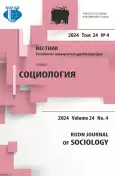Sociological approach to the study of Russia’s image in the Indonesian media
- Authors: Muzykant V.L1, Syurkani P.1
-
Affiliations:
- RUDN University
- Issue: Vol 24, No 4 (2024)
- Pages: 1148-1157
- Section: Sociological lectures
- URL: https://journal-vniispk.ru/2313-2272/article/view/323182
- DOI: https://doi.org/10.22363/2313-2272-2024-24-4-1148-1157
- EDN: https://elibrary.ru/OVZBJL
- ID: 323182
Cite item
Full Text
Abstract
The concept of a multipolar world is based on the idea of balance and equal rights for every country in the international world, and this concept was outlined in the Russian Foreign Policy Concept already in 2000. On several occasions, the President of Russia campaigned for a multipolar world order, which can be seen in some news reports in the Indonesian media. The sociological interpretation of the image is based on the descriptive qualitative framing analysis aimed at identifying how an event is understood and framed by the media. The authors collected the media data and conducted an analysis that allowed to make the following conclusions: first, a multipolar world is a concept that based on the idea of balance and equality; thereby, the geopolitical model of a multipolar world order is to replace the existing paradigm dominated by one civilization which extends throughout the world under the slogans of globalization, Westernization, Americanization, universalization, standardization and liberalization. Second, the image of Russia in the Indonesian media in relation to the multipolar world order creates the representation of the country as the one that encourages other states experiencing rapid growth to assert their sovereignty and defend their national interests, traditions and culture. Another image of Russia implies the same accent on the presence of countries experiencing free rapid development as confirming that the contemporary world is no longer under the influence of just one country or one pole, because every country has the same sovereign rights. Thus, Russia’s position as presented in the Indonesian media certainly finds the approval and support of the Indonesian society.
About the authors
V. L Muzykant
RUDN University
Author for correspondence.
Email: vmouzyka@mail.ru
доктор социологических наук, профессор кафедры массовых коммуникаций Miklukho-Maklaya St., 6, Moscow, 117198, Russia
Panca Syurkani
RUDN University
Email: pancasyurkani@gmail.com
аспирант кафедры массовых коммуникаций Miklukho-Maklaya St., 6, Moscow, 117198, Russia
References
- Andhita P.R. Assistance in writing online media opinions on PC IMM Banyumas using a group achievement approach. LPM Newsletter. 2021; 24 (2).
- Andreevich D.D. Concept of multipolarity in the Western, Russian and Chinese academic discourse. Sententia. 2020; 2 (2).
- Anholt S. The media and national image. Place Branding and Public Diplomacy. 2009; 5 (3).
- Buhmann A. Measuring Country Image. Wiesbaden; 2016.
- Canggara H. Communication Dimensions. Jakarta; 2003.
- Chebankova E. Russia’s idea of the multipolar world order: Origins and main dimensions. Post-Soviet Affairs. 2017; 33 (3).
- Degterev D.A. Multipolar world order: Old myths and new realities. RUDN Journal of International Relations. 2019; 19 (3).
- Entman R.M. Framing: Toward clarification of a fractured paradigm. Journal of Communication. 1993; 43 (4).
- Kaban K. Multipolar world vision: Civilization factors and Russia’s position in the new world order. URL: https://koran-jakarta.com.
- Krauthammer C. The unipolar moment. Foreign Affairs. 1991; 70 (1).
- Narbut N.P., Trotsuk I.V. Neighboring countries’ images: Persistent stereotypes of the Russian student youth. RUDN Journal of Sociology. 2017; 17 (3).
- Narbut N.P., Trotsuk I.V. Sociological evaluation of neighbor countries’ images: Methodological issues. V.A. Mansurov (Ed.). Russian Sociology in the Period of Crisis, Critique and Changes. Moscow; 2013.
- Nur E. The role of mass media in facing the invasion of online media. Journal Mass Communication. 2021; 52 (2).
- Nurudin N. Development of Communication Technology. Jakarta; 2017.
- Peters M.A. The emerging multipolar world order: A preliminary analysis. Educational Philosophy and Theory. 2023; 55 (14).
- Pinontoan N.A., Wahid U. Analysis of the framing of Jakarta flood reports in January 2020 in the daily Kompas.com and Jawapos.com. Community: Journal of Communication and Information Technology. 2020; 12 (1).
- Priangani A. Development of Brics (Brazil, Russia, India, China and South Africa) in the global political economy. National Journal. 2015; 4 (7).
- Putri R.M. Russia’s interest in collaborating with Indonesia in the field of space technology. Jom Fisip. 2016; 3 (2).
- Rosmawandi H. Indonesia’s geopolitical position in the rivalry between China and the United States. Changing Thinking. 2022; 1 (2).
- Santosa R. Framing analysis of ethnic Chinese reporting in the online media in February 2016. E-Communication. 2016; 4 (1).
- Sapto A.I. Russia Calls Indonesia a Strong Candidate to Join BRICS. URL: https://www.kompas.com.
- Saputra A.A. Putin: the Multipolar Campaign and Indonesia. URL: Sindonews.com.
- Saragih M.Y. Mass media and journalism: A study of the meaning between the print mass media and journalism. Community Empowerment. 2019; 6 (1).
- Shapiro J. Is a multipolar world forming? URL: https://geopoliticalfutures-com.
- Sinaga K.C.S. Analysis of the framing of Sarinah bomb reporting on Kompas.com and Merdeka.com. Jom Fisip. 2016; 3 (2).
- Sobur A. Media Text Analysis. Bandung; 2012.
- Warouw D.M.D., Rembang M. The importance of websites as tourism information media for Minahasa regency. Acta Diurna Communications. 2020; 2.
- Shri Bimo E. Putin: Indonesia as a driver for the birth of a multipolar world together with Russia, China, India and Brazil. URL: https://www.kompas.tv.
- Xinhua: Putin discusses the stable development of a multipolar world order. URL: https://www.antaranews.com.
Supplementary files









